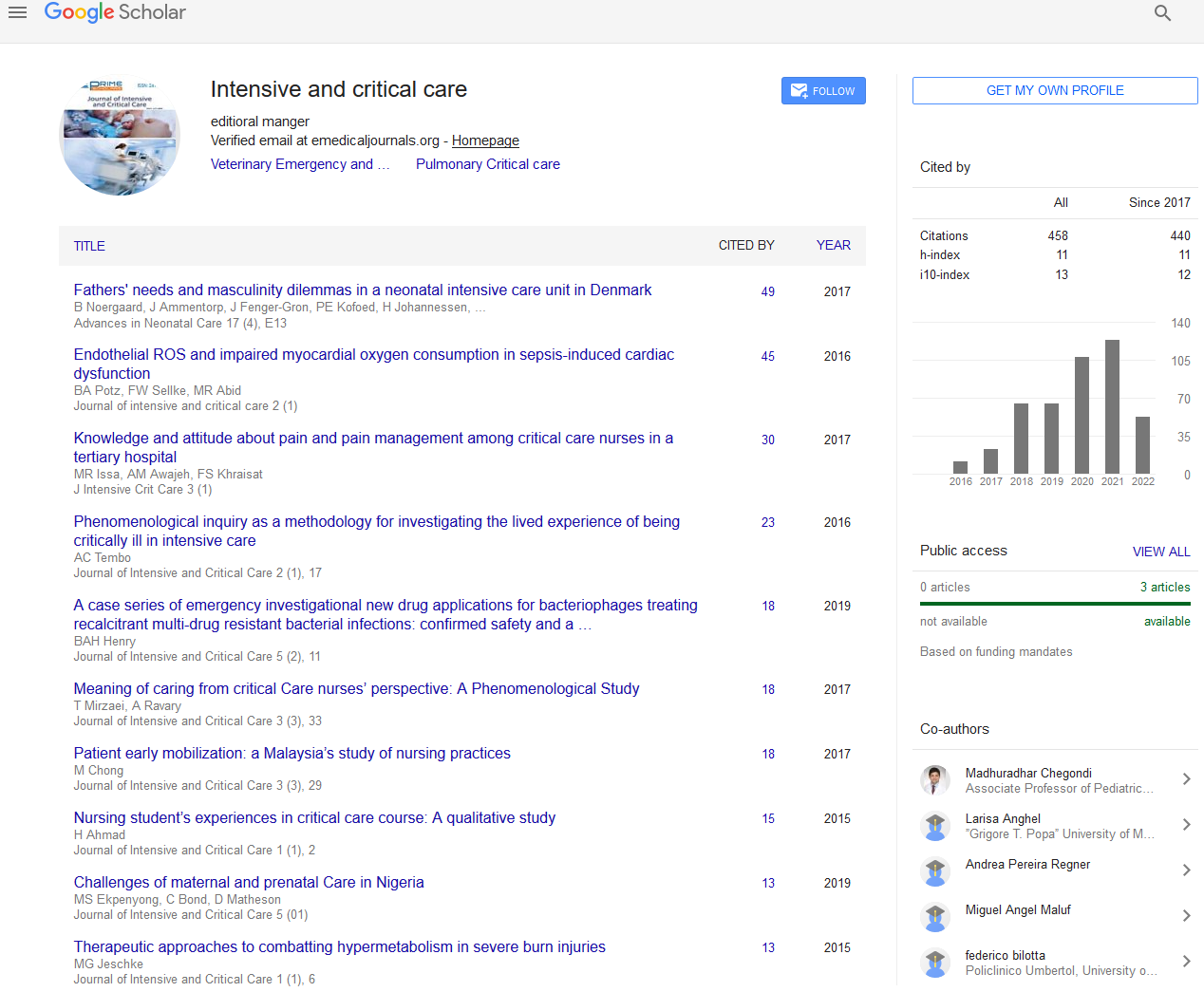Commentary - (2024) Volume 10, Issue 2
Understanding the Role and Importance of Intensive Care Units
Royce Johnson*
Department of Emergency Medicine, Beykent University, Turkey
*Correspondence:
Royce Johnson,
Department of Emergency Medicine, Beykent University,
Turkey,
Email:
Received: 01-Apr-2024, Manuscript No. IPJICC-24-19705;
Editor assigned: 03-Apr-2024, Pre QC No. IPJICC-24-19705 (PQ);
Reviewed: 17-Apr-2024, QC No. IPJICC-24-19705;
Revised: 22-Apr-2024, Manuscript No. IPJICC-24-19705 (R);
Published:
29-Apr-2024, DOI: 10.35248/2471-8505-10.2.13
Description
In the realm of modern medicine, Intensive Care Units (ICUs)
stand as the epitome of advanced care, providing life-saving
interventions to patients facing critical health conditions. These
specialized units serve as the last line of defence, offering a
unique blend of expertise, technology, and round-the-clock
monitoring to stabilize and support patients during their most
vulnerable moments. This article delves into the significance,
functions, and evolution of ICUs, shedding light on their pivotal
role in healthcare systems worldwide. Initially, ICUs primarily
catered to patients recovering from surgeries or experiencing
acute medical crises. However, over time, their scope expanded
to encompass a diverse range of conditions, including trauma,
organ failure, severe infections, and respiratory distress.
ICUs are meticulously designed environments optimized for
critical care delivery. They feature state-of-the-art equipment,
such as ventilators, cardiac monitors, and infusion pumps,
to facilitate advanced medical interventions. Moreover,
ICUs boast a multidisciplinary team comprising intensivists,
nurses, respiratory therapists, pharmacists, and other allied
healthcare professionals, collaborating seamlessly to provide
comprehensive patient care. One of the cardinal principles
governing ICU care is the emphasis on prompt and proactive
intervention. Time is of the essence in critical care scenarios,
where delays can precipitate irreversible organ damage or
even death. Thus, ICUs prioritize rapid assessment, diagnosis,
and initiation of appropriate treatments to mitigate the
progression of acute illnesses and optimize patient outcomes.
Nurses constitute the backbone of ICUs, playing a pivotal
role in patient monitoring, medication administration, and
emotional support. Their specialized training equips them with
the skills necessary to navigate the complexities of critical care,
including hemodynamic instability, mechanical ventilation, and
complex wound management. Moreover, ICU nurses serve as
advocates for patients and families, fostering communication
and facilitating shared decision-making amidst challenging
circumstances. Advancements in medical technology have
revolutionized the landscape of critical care, empowering
healthcare providers with an array of innovative tools and
techniques. From minimally invasive monitoring devices to
telemedicine platforms, these technological marvels enhance
diagnostic accuracy, streamline therapeutic interventions, and
facilitate remote consultation with specialists. Additionally,
Artificial Intelligence (AI) and machine learning algorithms
hold immense potential in predicting patient deterioration,
optimizing resource allocation, and personalizing treatment
regimens in ICUs. Despite their lifesaving capabilities, ICUs
are not immune to challenges and ethical dilemmas. Resource
constraints, staffing shortages, and allocation decisions often
pose dilemmas for healthcare providers, forcing them to
navigate the delicate balance between beneficence, autonomy,
and justice. Moreover, end-of-life care decisions in ICUs raise
profound ethical questions regarding quality of life, futility
of treatment, and patient autonomy, underscoring the need
for transparent communication and compassionate decisionmaking
processes. Looking ahead, the landscape of intensive
care medicine is poised for continued evolution and innovation.
Emerging technologies, such as wearable biosensors, pointof-
care diagnostics, and personalized therapeutics, hold
promise in revolutionizing patient care delivery and outcomes
in ICUs. Moreover, integrated care models, interdisciplinary
collaboration, and emphasis on patient-centred approaches
are likely to shape the future trajectory of critical care, ensuring
optimal outcomes and enhanced quality of life for patients
facing critical illnesses. Intensive Care Units represent the
pinnacle of modern healthcare, embodying a synergistic blend
of expertise, technology, and compassionate care.
Acknowledgement
None.
Conflict Of Interest
The author’s declared that they have no conflict of interest.
Citation: Johnson R (2024) Understanding the Role and Importance of Intensive Care Units. J Intensive Crit Care. 10:13.
Copyright: © 2024 Johnson R. This is an open-access article distributed under the terms of the Creative Commons Attribution License, which permits unrestricted use, distribution, and reproduction in any medium, provided the original author and source are credited.

